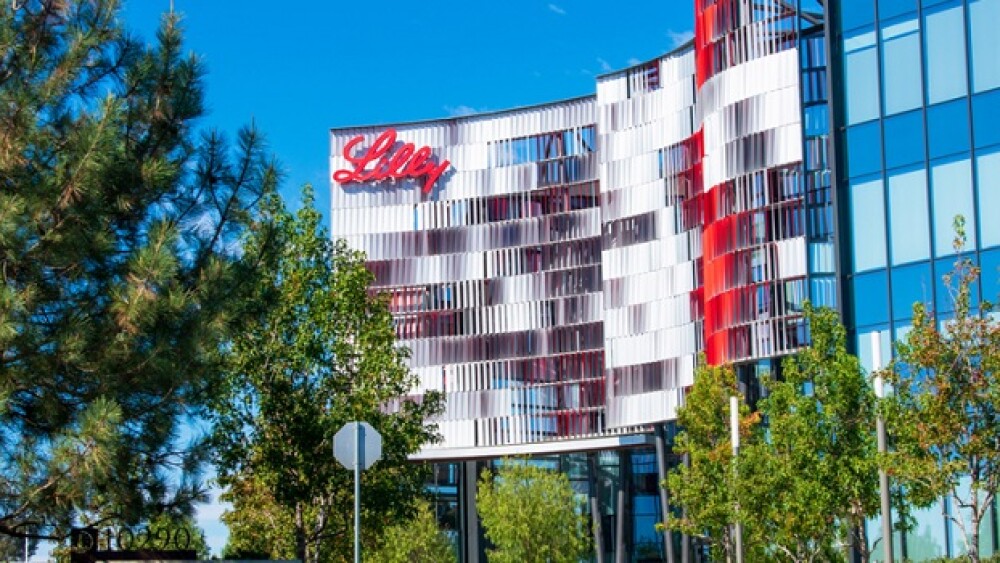Eli Lilly reported second-quarter revenue of over $8.3 billion, a 28% increase versus Q2 2022, beating estimates of $7.58 billion. The company Tuesday raised its full-year guidance by $2.2 billion.
Pictured: Eli Lilly/iStock, Michael Vi
Eli Lilly bumped up its full-year forecast after the company exceeded revenue expectations in the second quarter. Profit jumped 85% from the same period a year ago, with shares up 9% in premarket trading Tuesday morning on the news.
Total revenue for the quarter was over $8.3 billion for the pharma, a 28% increase over the same quarter last year, beating estimates of $7.58 billion. Growth was driven by its newest blockbuster Mounjaro, breast cancer treatment Verzenio and expanded indications for Jardiance.
Lilly’s Type 2 diabetes treatment Mounjaro (tirzepatide), approved in May 2022, led the way in new product growth. The GLP-1 injectable has already jumped to $1.5 billion in sales for the first half of 2023. Currently approved for Type 2 diabetes, Mounjaro is poised to add the hot indication of chronic weight management to its label by the end of this year.
However, Lilly said it “has experienced and continues to expect intermittent delays fulfilling orders of certain Mounjaro doses given significant demand.”
Data suggests the drug may be more effective for weight loss than Novo Nordisk’s Wegovy (semaglutide). Analysts predict the obesity market could reach $50 billion by 2030.
Verzenio, Lilly’s breast cancer pill, posted a 57% increase over the same quarter last year with $927 million in sales. It tops the company’s revenue list for now.
Lilly’s older Type 2 diabetes drug Jardiance has additional approvals for heart disease. Sales in the second quarter were $668 million, up 45% from the prior year. The drug is in a Phase III trial to lower risk of heart failure and death in patients after a heart attack.
A few product dips brought the earnings down in the second quarter a bit, joining ranks with other companies with pandemic-related products. Lilly’s COVID-19 antibodies posted $1.6 billion in sales for the first half of 2022 and no sales for 2023. The company’s chemo drug Alimta also posted a 73% drop to $61 million in sales in the quarter. Trulicity, a once-weekly injectable for Type 2 diabetes and the company’s top earner, also had a modest drop of 5%, with sales coming in at $1.8 billion for the quarter.
Lilly increased revenue guidance for the year by $2.2 billion with a range of $33.4 billion to $33.9 billion, driven by an increase in business development activity including the sales of rights for the olanzapine portfolio and Baqsimi.
The pharma divested some of its products this year, selling off its olanzapine portfolio to Cheplapharm Arzneimittel GmbH for $1.05 billion and Baqsimi, its low blood sugar nasal spray, to Amphastar Pharmaceuticals, Inc. for $500 million.
Anticipated for later this year is the approval of Lilly’s Alzheimer’s candidate donanemab. The green light is anticipated by the end of this year, adding it to the mix with Eisai and Biogen’s Leqembi for patients seeking disease-modifying treatments. Clinical trial results suggest the treatment can slow Alzheimer’s progression by 40% to 60%, with the higher efficacy present in patients at the earliest stage of disease. The market for these AD drugs is expected to surpass $13 billion by 2030 and grow from there.
Kate Goodwin is a freelance life science writer based in Des Moines, Iowa. She can be reached at kate.goodwin@biospace.com and on LinkedIn.






